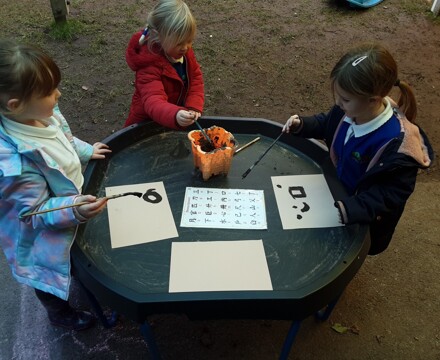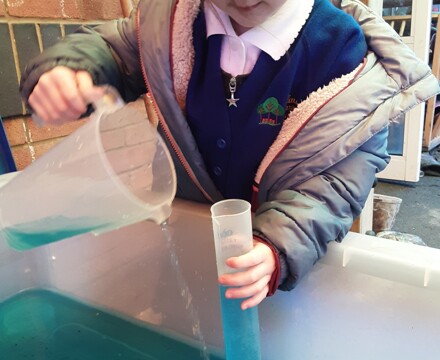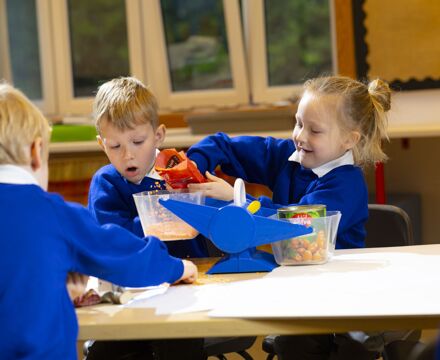EYFS
At The Avenue Primary School and Children’s Centre, we see the Early Years Foundation Stage as a unique and highly important phase in children’s education and place great emphasis on ensuring we provide a language rich environment.
Intent
Many of the children who enter our EYFS unit are from military backgrounds and many have English as an additional language. Our aim is to welcome all children into our setting and give them a safe and secure nurturing environment where they can flourish. We see relationships as being at the very heart of education and believe that knowing the children in our care really well will help them to thrive as learners. Many children enter through the nursery class with high social and emotional needs and speech and language delays. Our flexible play-based curriculum aims to meet their language needs, providing children with high quality interactions that continue to support the prime areas of their development as they move beyond nursery and into Reception.
It is important to us that our children have a passion and drive to learn in an environment where staff support them in making links with their learning through our ambitious and contextually appropriate curriculum. We want to excite children with a variety of learning opportunities, using both our indoor and outdoor space, and to immerse them into a world of imaginative play. Our intention is for all children to develop positive and mutually respectful relationships with one another, celebrating the cultural diversity within their class. We aim to work in partnership with parents and see them as a hugely important part of their children’s education. We want children to leave our Foundation Stage being confident, happy learners, with a high degree of independence.
Implementation
We know that children learn best when they have the time and familiarity of resources to revisit and consolidate experiences. We offer a continuous provision environment where children are able to choose to learn indoors or outdoors. This is available to the children throughout the year and regardless of the weather. We offer a rolling snack during the day giving children the flexibility to play without interruption and allowing them the opportunity to become deeply involved in their learning.
Carpet times are carefully planned into the day so as not to interfere with the flow of play. Nursery children have one circle time in each morning and afternoon session with their keyworker. The focus for our youngest children is on the prime areas of learning. Children in Reception have several carpet sessions or group sessions a day. We follow the Little Wandle programme to teach daily phonics sessions. Reception children have three group reading sessions each week that focus on decoding, prosody, and comprehension. Maths is taught using the White Rose scheme. This is a mastery approach to the teaching of mathematics and is underlined by the principles of counting that are taught from nursery.
We are invested in building high quality relationships with children and achieve this by playing with them and observing their interests. We become in tune with each child and staff are able to successfully move their learning forwards by understanding where each unique child is in their development. The strong relationships we have with children support us in our nurturing view to behaviour management, developing their skills in self-regulation through timely and sensitive co-regulation techniques. This continues throughout their Reception year.
Each member of the nursery staff within the unit is carefully planned for so that they can model the skills and language that we want to develop in our children. The pastoral care of the children is of paramount importance to us and we have adults in specific roles to help ensure each child is safe and comfortable throughout the day. All the children and the staff in the unit learn Makaton in order to support communication and this continues into Reception. This is particularly important for our children who are new to the English language and those children with additional educational needs. The adults model purposeful reading and writing skills at every opportunity and excite the children to want to write. Our role-play areas are carefully planned to maximise writing opportunities, for example, taking appointments at the hairdressers or doctors surgery. We place great importance on the learning that goes on when children are involved in imaginative play and, in the nursery class, an adult is permanently based in this area. Children therefore get language modelled to them constantly and continue to develop skills in using full sentences, asking questions, and general ‘chit chat’.
Storytelling is an important part of our curriculum and children are exposed to different storytelling techniques as well as high quality texts. Children learn to internalise stories through our Talk for Write units and this further supports their writing of stories in their Reception year. Children are encouraged to write their own stories through their drawings and as they become more confident with writing, children begin to use their letters and sounds to communicate meaning.
We really value our partnership with parents and welcome them into the setting each term to see their child’s learning and development through our Focus Child framework. We also offer parents workshops each term that focus on specific areas of our curriculum such as communication and language, phonics and maths development.
Impact
Adults are able to observe children’s progress in a range of ways but most importantly we believe that being with the children ‘in the moment’ enables staff to see the direct impact of their teaching. Staff are able to notice the language children are using, how they interact with others, and the steps they take to solve problems. Staff also notice children’s progress through their levels of well-being and involvement. Our Focus Child framework enables staff to have professional dialogue about all the children at regular intervals and to understand where each child is developmentally. This involves looking at where children are on entry, the progress they have made, and the provision that needs to be put in place to support each child to make good progress. We use our own assessment tracker to understand if children are on track to make a Good Level of Development by the end of their Reception year. Staff have pupil progress discussions at regular points throughout the year where data and progress are analysed for each year group, class and individual pupils. Interventions are reviewed and adjusted accordingly.
The vast majority of children who come in with no or little spoken English still manage to achieve their ELG in speaking by the end of Reception and their progress can be seen through our specific EAL assessment criteria. Although many of our children come to us with a lower than average starting point, the rapid progress they make means that our outcomes at the end of their Reception year are in line with the national average.
The partnerships we build up with parents throughout their time with us mean that children’s learning and progress can be supported at home. Parents enjoy coming into the setting and will often comment on how their children continue their learning at home by the language they use or the songs they may sing. As a teaching team, we make time for regular discussion so that we can continually reflect on our practice to ensure our curriculum meets the needs of all our children and that all children make good progress. We are confident that by the end of the Foundation Stage our children have developed the necessary skills, knowledge and self-regulation skills to equip them for the next stage in their education.
Maths OverviewExpressive arts and design ProgressionLiteracy ProgressionPencil Grip ProgressionPersonal Social and Emotional ProgressionUnderstanding the World Progression







